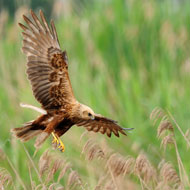Fire breaks out at RSPB nature reserve

The reserve is currently home to thousands of breeding bitterns, woodlarks and marsh harriers.
Firefighters were called to an RSPB nature reserve on Monday (25 March) to tackle a blaze that spanned around three acres of undergrowth.
According to the East Anglian Daily Times, three crews were called to the North Warren Nature Reserve in Suffolk at around 11.30am. The reserve lies to the north-east of Aldeburgh and is currently home to breeding bitterns, woodlarks and marsh harriers.
According to the report, a stop was called on the incident at around 1.20pm. The cause of the fire is not yet known, but a spokesperson told the EADT a full investigation is underway.



 The veterinary mental health charity Vetlife is inviting the veterinary community to join it for a sponsored cold-water dip.
The veterinary mental health charity Vetlife is inviting the veterinary community to join it for a sponsored cold-water dip.